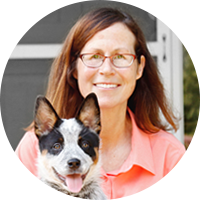January 13, 2014
I believe that my dog was exposed to an aggressive dog. An experienced trainer gave me some advice on what to do. What is your opinion on my situation?
Full Question:
I read all about dog aggression towards other dogs. My 15 months old female GSD has most probably been exposed to an aggressive dog (not attacked) at the age of 6 months. An experienced trainer in Austria recognized the reason for her aggression towards other dogs and advised me to raise her up with her collar whenever she would bark aggressively or try to run towards other dogs. That would cause her discomfort and she would eventually stop the behavior. What is your opinion? He also exposed her to a lot of other dogs during training sessions so she would learn that she had nothing to fear from other dogs. You don't give me much hope that this behavior can ever be corrected once a dog has become dog aggressive. Is there really nothing that can be done in your opinion? 
 Ed's Answer:
Ed's Answer:
I am not sure I understand your opening statement of your email – "I read all about dog aggression towards other dogs."
If that were the case you would not be doing what this trainer in Austria asked (or told) you to do. It didn’t work did it?
It's old school training that often times works for a short period of time but the behavior comes back.
With many dogs it can make them neurotic. For whatever reason the dogs are afraid. They take the position that the best defense is a good offense. Then they find out that their handler (who is supposed to love them) tries to kick the hell out of them and that just causes more emotional problems. How does that make any sense?
The odds are many dogs will always be concerned with strange dogs. Those dogs' handlers need to do a number of thing:
I recently produced a short video on Management for one of our recent newsletters. It’s free to watch if you can watch streaming video on your computer. I suggest you watch it. Good management is just as important as good obedience training when it comes to living with a dog.
Regards,
Ed Frawley
If that were the case you would not be doing what this trainer in Austria asked (or told) you to do. It didn’t work did it?
It's old school training that often times works for a short period of time but the behavior comes back.
With many dogs it can make them neurotic. For whatever reason the dogs are afraid. They take the position that the best defense is a good offense. Then they find out that their handler (who is supposed to love them) tries to kick the hell out of them and that just causes more emotional problems. How does that make any sense?
The odds are many dogs will always be concerned with strange dogs. Those dogs' handlers need to do a number of thing:
- Don’t allow strange dogs near them. You’re the pack leader, act like one. If a strange dog tries to come near your dog, you step in front and drive the other dog away. THAT SPEAKS VOLUMES to your dog. It teaches them that you are not going to allow anything to happen to it and when it comes to that understanding it will relax because it knows you will take care of business.
- Now common sense should tell you to not take this dog someplace where there are other off leash dogs. Many people don’t have an ounce of common sense so those people need to be spoon fed.
- I wrote an article on how to socialize puppies. The work in this article also applies directly to situations like this. You may want to read it. Do what it says.
- We expect our dogs to look at other dogs as parts of the environment. They are to ignore these other dogs and focus on what we want them to do when around other dogs. In other words, we want them to engage with us in the presence of other dogs. This is a learned – trained behavior.
- If we had your dog we would first work on engagement training. The DVDs I produced teach people like you how to do this - The Power of Training Dogs with Food and The Power of Playing Tug with Your Dog. Once the dog learned engagement and it could be put on cue we would then work engagement in areas where there were other distractions. We would slowly increase the level of distraction to the point where we were doing it some distance from other dogs (maybe a block away from a dog park).
- When we got that we would find someone who had a dog that totally ignored other dogs. We would NOT expect these dogs to interact. We would work distance/engagement around this other dog. With the goal being to shorten the distance.
I recently produced a short video on Management for one of our recent newsletters. It’s free to watch if you can watch streaming video on your computer. I suggest you watch it. Good management is just as important as good obedience training when it comes to living with a dog.
Regards,
Ed Frawley
100% (11 out of 11)
respondents found this answer helpful


Can't find what you're looking for?








